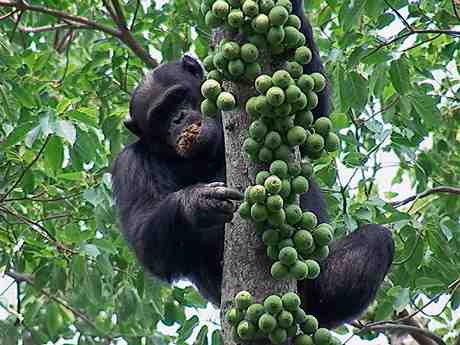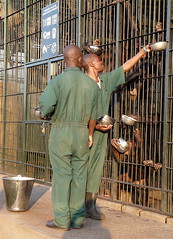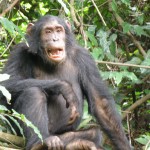
Nani waddles towards me with her arms stretched to the sky in a child’s ‘pick me up’ gesture. She climbs up as if I were a tree, securing her short muscular legs around my waist and her long arms around my neck. I stroke her coarse black fur, breathing in a musky baby smell.
Twenty-one countries (all in Africa) still have wild chimpanzee populations.
But their numbers are dwindling due to bush meat, poaching, wild animal trade, and habitat destruction.
Ngamba Island Sanctuary in Uganda is one of the only places in the world where you can have an up close experience with almost-wild chimpanzees. I’ve taken an hour-long boat ride from Entebbe to the island, for the opportunity to walk and play with the sanctuaries youngest residents.

Chimpanzees share 98.4% of our DNA
Chimpanzees are so biologically alike to us they are vulnerable to our diseases and viruses. Visitors to the sanctuary are required to have a series of shots: hepatitis B, meningitis, TB, and prove immunization against mumps, measles and polio before being allowed to get close to Nani and the other orphaned chimps that now call Ngamba Island home.
Into the Forest
With thirty-pound Nani on my hip, I follow the caretakers, three other tourists, and nine chimpanzees into the 100-acre forest the orphans share with fruit bats and monitor lizards. Surrounded by Lake Victoria, this Island Sanctuary is an ideal place for water fearing chimps to roam un-caged.
At a resting spot, Nani lies on the ground next to me, staring at the clouds. Her head follows the path of a Fish Eagle flying over, and then a butterfly, until her golden eyes are inches from my face. I touch her leathery palm, looking back at her, careful not to stare. Our connection feels different than what I have with people, or with my pets. It’s quiet, more spiritual. When our group is ready to continue walking, Nani resumes her place on me.
“Nani was confiscated as an infant by a soldier in war torn Congo,” the caretaker tells me. “She loves being held.”
Childhood Horror
Later, I sit next to a long-limbed chimp named Sunday who rocks back and forth like a mentally ill person.
“He worked in a circus act in Italy, Hungary and Austria before being rescued,” the caregiver says. “When he wasn’t performing he was kept in a small cage.”
Each of the forty chimps at this sanctuary has their own horrific history. Can sanctuary life compensate for the killing of these chimps’ families for bush meat, and the pet trade? Can this island forest offer the same resources their natural home did? My only solace lies in knowing that for sanctuaries, Ngamba Island Chimpanzee Sanctuary is among the best in the world.
Returning to the field where we had first started our walk an hour earlier, Nani jumps off me to share a banana with her best friend Nakuu, and I join my human tribe to share stories about one of the most special experiences of our lives.
* * *
To arrange a visit to Ngamba Island Chimpanzee Sanctuary contact me for advice on best operators to use: lorisavingwild.com.
2 Replies to “Holding Chimpanzees at Ngamba Island Sanctuary”
Comments are closed.


Great writing and reporting Lori. A sad story, but with a opportunity to know about the truth here. Gosh, I can’t wait to see these next year when I go to Africa on one of your trips.
Best to you and all living creatures here and in Africa.
An encounter so poignantly and vividly told!
I remember another extraordinary blog in which you described your emotions as you waited for Nani to select you as “the one”.